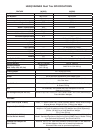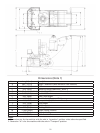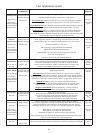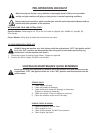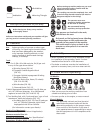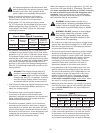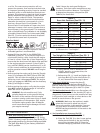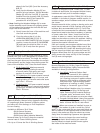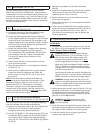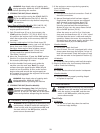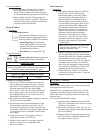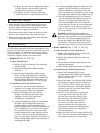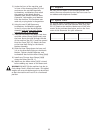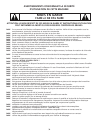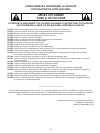
28
4.6
Multi-Segmented Diamond Disks [Q]
[See FIG. 24 & FIG. 25]
4.7
Tool Holding Pad (HH) Installation
[See FIG. 19, FIG. 20, FIG. 21, FIG. 22, FIG. 23]
For Light Scarifying and cleaning. Flat wires are avail-
able in many sizes and configurations. They should be
rotated end-for-end in the Accessory Disk [P] every hour
to avoid the wire taking a “set” (wire will bend in one
direction). External weight added to machine will NOT
normally increase production rates, but only accelerate
the wire brush wear rates.
a) Temporary removal of the Front Shield (A) may
be required to complete this installation.
b) Attach the Multi-Segmented
Diamond Disks (Q)
to the Adapter Plate (R) using the four (4) Flat Head
Screws (S1) and Thin Locknuts (S2) provided in the
Adapter Plate Kit (Kit Part Number 177861). Tighten
the Screws (S1) securely. Repeat this procedure for
the other Adapter Plate (R).
c) Attach the Diamond Disk / Adapter Plate Assembly
to the machine using the three (3) Capscrews
(T1), Lockwashers (T2), and Washers (T3) provided
in the Adapter Plate Kit. Tighten the Capscrews
(T1) securely. Repeat this procedure for the
other assembly.
d) Gently lower the front of the machine until the
tools touch the ground.
e) Pivot the axle so that it is in the Operation Position
[F] [See FIG. 11].
f) Lower the
Front Shield [A] from its upper position.
Loosen the three (3) capscrews and lower the
shield so that it is only 3/8-1/2” (10-12 mm) from
the ground.
Notes: If machine starts to vibrate and shake try
removing external weight from the machine. If the
vibration continues, move the axle into the “E2”
position [See FIG. 11]. This position is normally a
“transport” position, but for the diamond disks it
removes most of the weight from the front of the
machine and allows the disks to glide over the surface
rather than dig into the surface.
This machine will allow the use of Scrubbing Pads [JJ]
that are available from another manufacture.
a) Position the triangular area of the Tool Holding Pad
[HH] [See FIG. 21] so that it mates with the
triangular area on the Accessory Disk [P].
b) Use the 1/2-20UNF x 1-1/4” Long Capscrew [SS1] and
Lockwasher [SS2] to attach the Tool Holding Pad to
the Accessory Disk. Tighten the capscrew securely,
using the ¾” (19 mm) End of the Wrench [V] [Shown
in FIG. 8].
c) Repeat this procedure on the other Accessory
Disk [P].
d) Install the
Scrubbing Pads [JJ], two (2) per machine.
Gently press the tool onto the hook and loop
fastening system until it is secure.
e) Gently lower the front of the machine until the
tools touch the ground.
f) Pivot the axle so that it is in the Operation Position
[F] [See FIG. 11].
g) Lower the
Front Shield [A] from its upper position.
Loosen the three (3) capscrews [See FIG. 2 & FIG. 3]
and lower the shield so that it is only 3/8-1/2”
(10-12 mm) from the ground, then re-tighten the
three (3) capscrews.
5. Operating Instructions
All Models:
• Configure the unit with the proper tool for the job.
See Section 4 of this document for tool installation.
Start / Stop of Electric Models:
WARNING: Make sure the Voltage Change
Switch (J) [See FIG. 5], is set to either 115, or
230 Volt, to match the voltage supply. The
Voltage Change Switch (J) position is never
to be changed while the motor is running.
Make sure that the Voltage Change Lock Bolt
(TT) is in position. It will prevent the Voltage
Change Switch from being accidentally moved
into the wrong position.
Local electrical codes may require changing the
Plug (LL) [See FIG. 1] on the motor to the proper
NEMA connector to match the voltage supply.
WARNING: Always make sure the unit is con-
nected to a properly grounded electrical outlet.
Failure to comply with this warning could result
in serious bodily injury or death!
WARNING: DO NOT push down on the
handles enough to lift the grinding disks
from the ground.
1) Before starting the electric motor (if set for 115 Volt
Operation) push down on the handles just enough
to release pressure from the grinding disks. Start
the electric motor by turning the Power Switch [H]
(See FIG. 6) to the ON position.
4.5
Wire Brushes [See FIG. 26]
2) Once the motor has reached full speed, reduce the
downward pressure applied to the handles and let
the weight of the machine rest on the ground.
3) Hold the handles firmly and gently guide the
machine over the work area.



